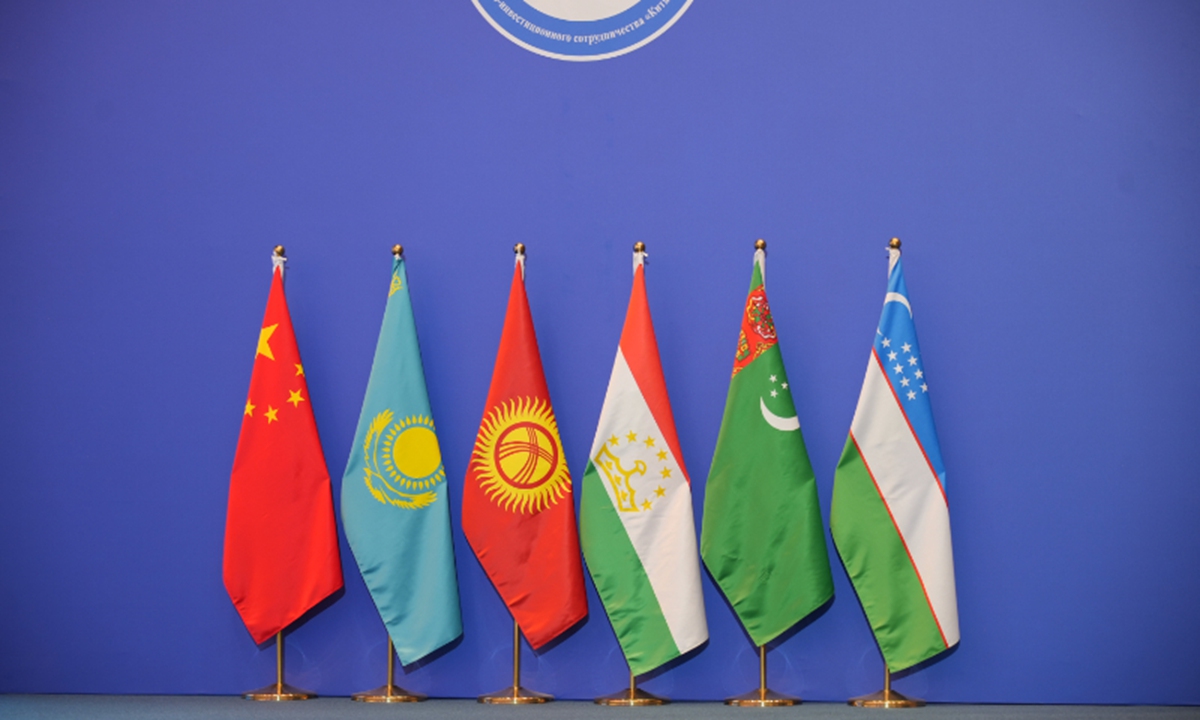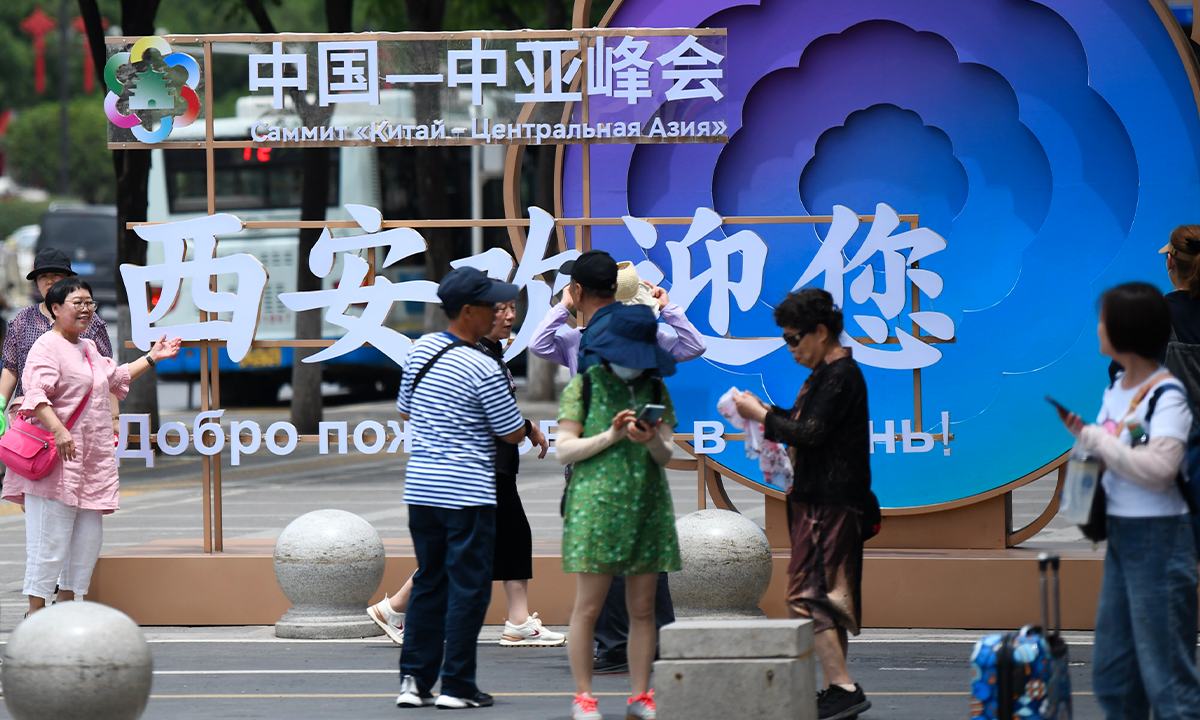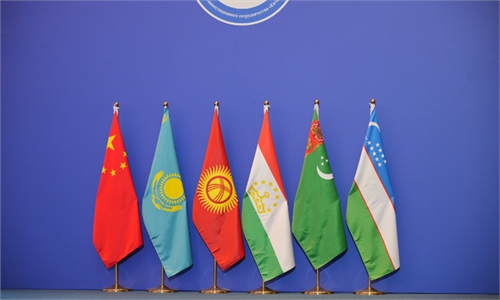China-Central Asia Summit to witness signing of a slew of documents in trade, investment, connectivity and other fields: official
Landmark gathering to inject impetus into high-quality BRI cooperation

China + Central Asia (C+C5) Photo: VCG

Tourists take photos with an installation of the China-Central Asia Summit in Xi'an, northwest China's Shaanxi Province on May 16, 2023. The summit is set to take place on May 18 and 19. Photo: Xinhua
With the China-Central Asia Summit drawing closer, Xi'an has demonstrated its hospitality in full swing to welcome visiting guests from Central Asian countries and deep friendship between China and the five countries. Chinese officials said leaders of the six countries will exchange views on establishing mechanisms, cooperation and international, regional issues with respective concerns, as well as signing a slew of important political documents on trade, investment, connectivity and other areas.
Experts believe China's cooperation with Central Asian countries, based on win-win results and mutual respect, can be seen as a paragon of international relationship in the new era. Unlike the US engaging with Central Asia to pursue selfish purposes, China's collaboration with regional countries do not target any third party, nor aim to compete with others, they said.
National flags of China and five Central Asian countries were planted alongside airport highway in intervals, and banners saying "build a closer China-Central Asia community with a shared future" in both Chinese and Russian, can be seen at overpasses in the city.
The summit is the first major diplomatic activity that China hosts this year, and also the first summit held offline by the heads of state of the six countries since the establishment of diplomatic ties 31 years ago. The event is a historic milestone in the development of relations between China and Central Asian countries.
At the invitation of Chinese President Xi Jinping, President Kassym-Jomart Tokayev of Kazakhstan, President Sadyr Japarov of Kyrgyzstan, President Emomali Rahmon of Tajikistan and President Shavkat Mirziyoyev of Uzbekistan will pay state visits to China respectively from Tuesday to Saturday this week.
Yu Jun, deputy director-general of the Chinese foreign ministry's Department of European-Central Asian Affairs, said at a Tuesday press briefing that Xi will deliver a keynote speech at the summit, expounding on China's stance on how to construct China-Central Asia community with a shared future , eyeing long-term development for cooperation between the six countries, putting forward series of propositions and announcing multiple pragmatic measures and actions.
Yu said nearly 20 bilateral and multilateral activities will be held during the two-day summit. At the summit, leaders will exchange their views on establishment of mechanism, cooperation and international, regional issues of respective concerns. Leaders of the six countries are expected to sign a slew of important political documents on areas such as economic, trade and connectivity, said Yu, adding that President Xi and his wife will also hold a special welcoming ceremony and grand dinner for the leaders and wives of the five countries.
China's cooperation with Central Asia does not target any third party and China-Central Asia cooperation mechanism does not aim to compete with other mechanisms, said Yu. China supports anything that is truly beneficial for the region's development, and helps the common prosperity of the region, Yu noted.
Breakthroughs in cooperation
The summit will further consolidate the consensus of China and Central Asian countries to build together a high-quality Belt and Road, said Wang Wenbin, spokesperson of the Chinese Foreign Ministry at a Tuesday briefing. "We believed at Xi'an, the starting point of ancient Silk Road, China and Central Asian countries will make the ancient road come to new life via the China-Central Asia Summit, and make greater contribution to the construction of a closer China-Central Asia community with a shared future," said Wang.
At a press conference on Tuesday, Sun Wensheng, deputy head of the Civil Aviation Administration of China's (CAAC) general department, said that CAAC and the five countries of Central Asia are discussing and preparing to sign a Memorandum of Understanding to jointly develop an "Air Silk Road." They are also working together to create regulations and improve the quality and efficiency of their cooperation in the civil aviation field.
The CAAC is also encouraging airlines to open and add more flights between China and Central Asia. Currently, 10 airlines are operating flights between the two regions.
Chinese observers said the summit will witness new breakthrough in economic and trade cooperation between China and Central Asian countries.
"Central Asia's strategic importance has become more prominent as China upped the construction of the Belt and Road Initiative, and those countries are playing an increasingly important role in China's diplomatic strategy. Moreover, Central Asian countries are eager to cooperate with China to boost their long-term development," Li Yongquan, director of the Eurasian Social Development Research at the Development Research Center of the State Council, told the Global Times.
China's trade with the five Central Asian countries reached $70 billion in 2022 and recorded a year-on-year expansion of 22 percent in the first quarter of this year, Shu Jueting, spokesperson for China's Ministry of Commerce, said last month.
Zhu Yongbiao, executive director of the Research Center for the Belt and Road at Lanzhou University, told the Global Times that after this summit, the connectivity between China and Central Asia will be further elevated, which will benefit both economic trade between China and the region, and also lift Central Asia's geopolitical status.
Cooperation with Central Asia will also help China to further collaborate with countries in South, West Asia, as well as Caucasus region. The extended cooperation, according to Zhu, will inject vitality and stability to the region's growth during the post-pandemic era.
Experts also believe the summit will emphasize on security, an area China and Central Asian countries have closely cooperated on for years. Qian Feng, director of the research department at the National Strategy Institute at Tsinghua University told the Global Times that he expects the six countries to reach more consensus on how to help in resolving the Ukraine crisis and address Afghanistan concerns, as "Central Asian countries share and support China's proposition on solving the Russia-Ukraine crisis, as well as dealing with the spillover of the Afghanistan issue."
New model of international relation
As China's ties with Central Asia are heating up, the US is also seeking to engage closely with the region amid the Russia-Ukraine crisis. Observers debunked US'sudden interest in the region, saying it wants to sow discord between China, Russia and the five Central Asian countries, as well as to secure its own interest when Washington's influence in the region diminished after hasty withdrawal from Afghanistan.
Earlier this year, US Secretary of State Antony Blinken visited Kazakhstan and Uzbekistan, where he signaled that Washington is changing tack in the region. US officials have said the Biden administration is seeking to step up engagement with the region, especially for countries facing an economic fallout from the Russia-Ukraine conflict.
Although the US is striving to pull over Central Asia countries, those countries are always adopting diverse and balanced diplomacy, which China understands, said Zhu. "The cooperation China has with Central Asia is based on win-win result, transparency and mutual trust, respect, thus no matter how Western countries smear and sow discord, it won't affect China's ties with the region."
After the fourth China-Central Asia Foreign Ministers' Meeting in Xi'an last month, the foreign ministers reached a consensus that all parties reiterated their respect for respective choice of a development path suitable to their own national conditions, firm mutual support on issues concerning each other's core interests, stern opposition to external interference in internal affairs, and resolute rejection of any individual or any force creating chaos and turbulence in Central Asia.
Li said that compared with the US, whose diplomatic policy is pivoted around serving its own interest first, and keen to foment dissension, China's relationship with Central Asian countries is the paragon of health international relations. Convening the China-Central Asia Summit demonstrated high recognition between China and Central Asian countries regarding the bilateral ties, and will usher in a new era of closer cooperation and relations, Li noted.


